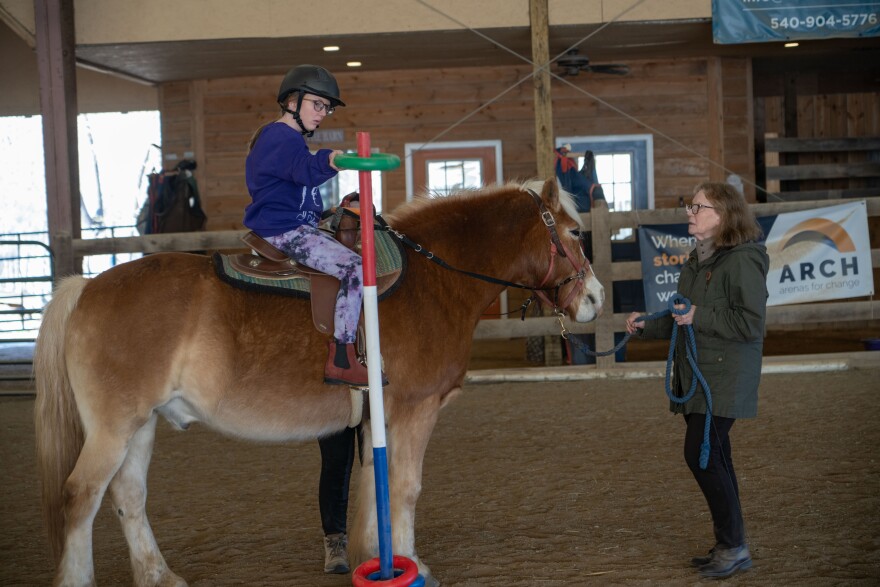People who have disabilities often don’t get to tell engineers what they wish they could change about their wheelchairs, or other adaptive technologies.
A group of engineering students at Virginia Tech have spent the past semester doing something not many in their field do, learning from people with brain injuries.
In a small restaurant in downtown Blacksburg, the students are listening to Steven Nape, talk about what it’s like to live with a brain injury.
“I may look fine in certain areas. But I’m not,” Nape told he students. He had a stroke in 2011. Then in 2017, he suffered a second brain injury.
“I got into a car accident which did a lot of damage that I haven’t recovered from,” Nape recalled.
Before his brain injuries, Nape was a college professor, and taught economics.
“Loved teaching,” Nape said. “And whenever I have an opportunity that could be helpful for students, I’ll do it.”
That’s why he’s volunteering to be part of this project. Undergraduate and graduate students have been spending time with Nape, at his home, and out in the community, learning what holds him back, and what technologies might help. The course is taught by Netta Gurari, a professor of Biomedical Engineering and Mechanics at Virginia Tech. Gurari says the class was supported by an Institute for Society, Culture, and Environment grant.
And while the students won’t be designing any new equipment for this class, some of the students say they do want to eventually work in this field, like undergraduate engineering student Ashil Amin.
“I think a lot of the courses we take are kind of disconnected from the people that it’s meant to one day help,” Amin said.
As a waiter brings water to the table, Amin and the other students listen as Nape shares that he no longer can go swimming. Once his favorite hobby, he can’t see well underwater. A student, Anna Feldbush, is thinking through what may help.
“Now if were to have smart goggles where you have a measurement of distance would you be able to focus?” She asked Nape. “Because I see that as a barrier of entry with the smart goggles.”
Feldbush is a PhD student and said she’s spent lots of time with her aunt, who has a neurological disability. But this experience has shown her the wide diversity of experiences, and limitations, people have.
“Someone like Steve, you would look at, and say ok he’s able to function on a daily basis,” Feldbush said. “But it’s not until you talk to him that you’re able to see those underlying disabilities.”
Jodi Judge is executive director of a local advocacy group, called Brain Injury Solutions of Southwest Virginia, and said conversations like this are much needed.
“And how can we connect those two minds? The brilliant minds of today, who are actually putting together the products, that our survivors and their families are actually gonna be using,” Judge said.
Judge’s group connected the Virginia Tech students with people willing to share what it’s like to live with their disability, including 19-year-old Maci Winebarger.
“I’m just a person at the end of the day,” she said. Wearing a bright orange sweater, Maci told the students about the limitations of her wheelchair.
It doesn’t work on the grass or on a beach. So the students are exploring what options might help.

Maci had a brain injury when she was 6 as a result of a surgery. At first, she couldn’t hold up her head on her own. Thirteen years later, she can walk, if someone helps guide her.
“I had to learn everything over again,” Maci remembers.
Her mom, Shari Winebarger, sat beside her at the table.
“It’s been an adventure. Some tough times,” Winebarger said. “But I’m so proud of her.”
Still, despite the progress, there are challenges, and moments when she can tell Maci is frustrated.
“Just watching her want to talk to people,” Winebarger said. “A lot of times people look at me, and they’ll say, ‘you know, well what does she [want]?’ And it’s like, ‘well there she is, ask her.’”
These past several months, the students have asked, and listened, to what Maci and others think could make the world more inclusive.
Maci said many improvements are simple.
“Make it more handicap accessible,” Maci said.
She said she thinks there should be better access inside restaurants and stores. And fewer hazards, like bumps or cracks in the floor that she could trip over. Or sidewalks without ramps, or aren’t fully accessible for people in wheelchairs.
The students in this class nod as Maci speaks. Perhaps, in years to come, they’ll design a wheelchair ramp, or other equipment, that she will use.


